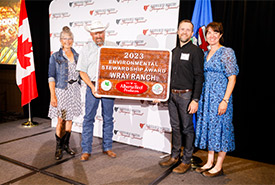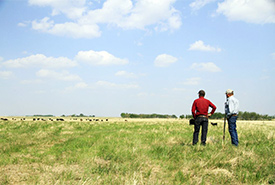Ranchers recognized for stewardship approach
Wray Ranch Receives 2023 Environmental Stewardship Award for Regenerative Agriculture Practices
The Wrays accept their stewardship award (Courtesy Alberta Beef Producers)
A group of Alberta ranchers has been honoured for their dedication to regenerative agriculture, which has created benefits reaching far beyond their operations.
To recognize outstanding environmental stewardship, Alberta Beef Producers (ABP), together with the Nature Conservancy of Canada and Ducks Unlimited Canada, presented the 2023 Environmental Stewardship Award to Wray Ranch. The ranch’s owners, Doug & Linda and Tim & Joanne Wray, were honoured for their remarkable efforts in using regenerative agriculture practices, which help the environment while improving productivity and profitability.
“We were lifted up as an example of great stewardship, and that’s a real honour because it’s something we value and are passionate about,” says Tim, on receiving the award.
Wray Ranch, located about 30 minutes northeast of Calgary, near Irricana, has a rich history dating back to 1910. The ranch operated for decades as a mixed farming venture, with a focus on annual croplands and some native pastures.
However, in 1998, the Wray family made a decision that would shape the future of their ranch. They began the process of converting over 400 hectares of cropland into high-legume perennial pastures and directing their attention toward cattle production and regenerative agriculture.
This transition proved to be a transformative experience for Wray Ranch. Over the years, the family noticed significant improvements in their soil health and ecosystem. By using rigorous grazing management techniques and paying close attention to the regrowth cycle of plants, the Wrays more than doubled the organic matter within their soil.
Beyond the benefits to soil health, the shift to regenerative agriculture has had positive effects on biodiversity. The presence of bird species on the ranch has multiplied, with Doug Wray counting an impressive 75 different bird species on the property. Native grasslands here have flourished, and the use of a strategic grazing rotation has helped maintain their diversity and productivity.
Enjoying this story? Sign up for our newsletter!
“We used to put the cows out on the pasture, and they would graze all summer,” says Tim. “But now, for the most part, our native grasses are grazed only once a year. They’re very diverse stands, and they have a good thatch layer throughout the year.”

Doug and Tim on Wray Ranch (Courtesy Alberta Beef Producers)
Thatch refers to the layer of dead plant material that accumulates above the soil, which provides many benefits, including moisture retention and temperature regulation.
Despite these positive changes, the transition to regenerative agriculture hasn't come without its challenges. In recent years, the area experienced dry conditions, leading to a reduction in pasture productivity. However, the Wray family remains committed to working in harmony with nature and adapting to the conditions they face.
“We have to live within the conditions that we’re operating,” says Tim. “That’s a big challenge, just dealing with nature and trying to be ready when she gives again.”
Tim expressed his gratitude for the recognition and emphasized that the award was not just for their efforts alone but also a recognition of the collaborative work within the forage and grazing community.
Alberta Beef Producers, Ducks Unlimited Canada and the Nature Conservancy of Canada jointly supported the 2023 Environmental Stewardship Award, recognizing its significance in promoting sustainable agricultural practices that benefit both the environment and the cattle industry. By embracing regenerative agriculture, Wray Ranch has exemplified the positive impact that thoughtful land management can have on ecosystems and local communities.
As the Wray family continues their journey toward environmental stewardship, their story serves as an inspiring example for others within the agricultural community, proving that sustainable practices not only benefit the environment but also lead to a thriving business.




